Bus Stop Blu-ray Movie
HomeBus Stop Blu-ray Movie 
Fox Studio Classics20th Century Fox | 1956 | 94 min | Not rated | Jul 30, 2013
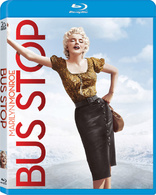
Movie rating
6.4 | / 10 |
Blu-ray rating
| Users | 4.8 | |
| Reviewer | 3.0 | |
| Overall | 3.2 |
Overview
Bus Stop (1956)
A naive but stubborn cowboy falls in love with a saloon singer and tries to take her away against her will to get married and live on his ranch in Montana.
Starring: Marilyn Monroe, Don Murray, Arthur O'Connell, Betty Field, Eileen HeckartDirector: Joshua Logan
| Romance | Uncertain |
| Drama | Uncertain |
| Comedy | Uncertain |
Specifications
Video
Video codec: MPEG-4 AVC
Video resolution: 1080p
Aspect ratio: 2.55:1
Original aspect ratio: 2.55:1
Audio
English: DTS-HD Master Audio 4.0 (48kHz, 24-bit)
French: DTS 4.0
German: DTS 4.0
Italian: Dolby Digital Mono
Japanese: DTS 4.0
Spanish: Dolby Digital Mono
Spanish: Dolby Digital Mono (Spain)
Thai: Dolby Digital 2.0
Turkish: Dolby Digital 2.0
Japanese only available on Japanese menu settings
Subtitles
English SDH, French, German, Italian, Japanese, Portuguese, Spanish, Cantonese, Croatian, Danish, Dutch, Finnish, Greek, Hebrew, Hungarian, Icelandic, Korean, Mandarin (Traditional), Norwegian, Polish, Swedish, Thai, Turkish
Discs
50GB Blu-ray Disc
Single disc (1 BD)
Playback
Region free
Review
Rating summary
| Movie | 3.0 | |
| Video | 4.0 | |
| Audio | 4.5 | |
| Extras | 0.5 | |
| Overall | 3.0 |
Bus Stop Blu-ray Movie Review
Worth the fare?
Reviewed by Casey Broadwater August 1, 2013By the mid-1950s, Marilyn Monroe had grown tired of the ditzy screen persona she had adopted for Gentlemen Prefer Blondes, How to Marry a Millionaire, and The Seven Year Itch. Hoping to land some more serious, dramatic roles, she began studying under Lee Strasberg at the Actors Studio—where she learned "The Method"—and also renegotiated her contract with 20th Century Fox, giving herself an unprecedented degree of creative control over the sorts of parts she could subsequently take. Whether she ever fully utilized that control is a matter of debate (or perspective). Her first film under this new arrangement was 1956's Bus Stop, based on the acclaimed play by William Inge and directed by former Stanislavski disciple Joshua Logan, who encouraged Monroe's new acting approach. If not a straight drama, Bus Stop is at least less of an outright comedy than most of Marilyn's 1950s films—the thriller Niagara and the western River of No Return excepted—but it still finds her in the role of a "dumb blonde," the kind of typecasting she was rarely able to shake. In this case, though, her character—a wayward nightclub singer looking to make it to Hollywood—has a bit more to offer, to some extent even mirroring the struggles that Monroe herself went through before becoming a star.
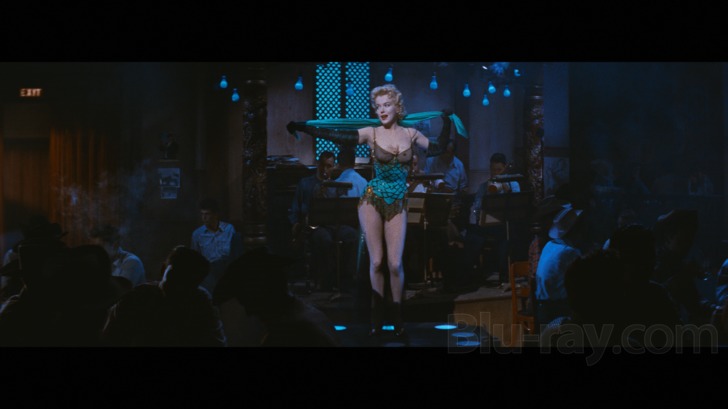
Marilyn plays Chérie, an Ozark hillbilly-turned-chanteuse who dreams of "Hollywood and Vine" but doesn't really have the talent or luck to get there. She's stuck working in a dive-y Phoenix, Arizona nightclub called The Blue Dragon, and one night, while warbling through a molasses-slow, out- of-tune version of "That Old Black Magic," she catches the eye of 21-year-old virgin Beauregard "Bo" Decker (Don Murray), a dopey and uncivilized cowboy in town to take part in a national rodeo competition. It's his first trip outside rural Montana, and it shows. He's rude, loud, and oblivious to the common courtesies of normal society. He's the sort of guy who orders his hamburger raw and chugs milk straight from the bottle.
With him is his mentor/father-figure, Virgil (Arthur O'Connell), who lives up to his Divine Comedy namesake by being the kid's steadfast guide. On the long bus trip to Phoenix, ol' Virge tells Bo, "it's time we find you a gal," but he doesn't expect that it'll be the first girl the naive cowpoke encounters. Virgil disapproves—he doesn't think Chérie "is good enough" for him—but Bo is instantly smitten. He's found his "hootenanny of an angel," and he's not about to let her out of his sight. And this is the film's ongoing conflict. Chérie is attracted to him—"You're so big and strong and, well, so darn healthy-lookin'."—but when Bo brings up how he wants to marry her the next day, she gets spooked, bucks, and tries to bolt off.
To Bo, Chérie is just another wild horse to be tamed, and as if this symbolism weren't obvious enough, at one point, he actually lassos her to keep her from getting on a bus to Los Angeles. In what amounts to a kidnapping, Bo loads her onto a coach bound back to Montana instead, and when they get stalled by a snowstorm, they hole up in a roadside diner run by the brassy Grace (Betty Field), who fends off some semi-unwanted attention herself from the eager-to-get-her-alone bus driver (Robert Bray). This is the "bus stop" of the title, and it's here that most of the film's drama goes down, climaxing in a tumbling fistfight in the snow that teaches Bo a lesson in humility and gentlemanly behavior. It's hard to buy his sudden turn-around from bronco buster to horse whisperer—if you follow—and harder still to make sense of Chérie's ultimate should-I-stay-or-should-I-go decision.
Aside from a large-scale parade sequence and the big rodeo, Bus Stop is a very contained, locationally-limited film; you can easily see how it could've been adapted from a stage play with no trouble. Much of the acting has a theatrical bent as well, particularly from Don Murray, a Broadway star who made his film debut here. Murray plays the role with a folksy, cornball broadness that grows tiring and is impossible to take seriously. He's too much—too brash, too hokey, too obnoxious—and it's a mystery how he was nominated for an Academy Award for Best Supporting Actor.
For all her method lessons, Marilyn's own performance is well shy of naturalistic, with an overdone hick accent that comes and goes, but her much-noted real-life lack of self-confidence actually work in the part's favor. Chérie is almost an entirely passive personality—she's acted upon more than she acts—and Monroe beautifully channels her own vulnerabilities. This was perhaps the first time in her career that she was viewed as more than just eye candy, and the film actually goes to great lengths to make her look rougher—for a lack of a better word—caking her with sickly-looking makeup and putting her in tattered costumes. It's not quite a Charlize Theron-in-Monster transformation, but it does help us to see beyond the pretty face to the pain and uncertainty beneath.
Bus Stop Blu-ray Movie, Video Quality 
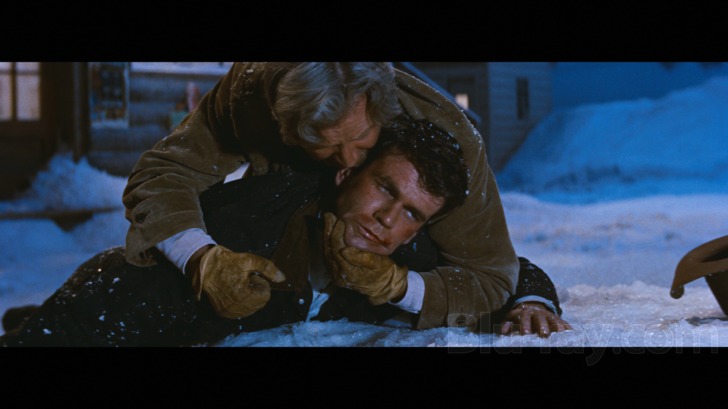
By 1956, the three-strip Technicolor system of Niagara and Gentlemen Prefer Blondes was considered too bulky and expensive, phased out by 20th Century Fox in favor of single-pack film stock, an ultra-wide Cinemascope aspect ratio, and DeLuxe Color processing. While Bus Stop may not have those inimitable Technicolor tones—with their creamy highlights—the film's DeLuxe Color look is still a thing of beauty, especially here in this 1080p/AVC-encoded presentation. The picture is wonderfully vibrant—see Chérie's Blue Dragon costume, or the interplay of warm skin tones and cool shadows during the fight scene in the snow—and clarity is greatly improved over previous home video editions, with crisp closeups that reveal ample skin and clothing textures. (I spotted two or three noticeably softer shots, but these are rare exceptions.) As usual, Fox's restoration work is excellent; there's nary a speck on the print, no major color or contrast fluctuations, no compression issues, and no sight of digital noise reduction, edge enhancement, or excessive color/contrast boosting. The film's natural 35mm grain structure is present in every scene, giving the high definition image a rich, organic quality that's the next best thing to seeing a projected print. Overall, another great catalog transfer from the Fox vaults.
Bus Stop Blu-ray Movie, Audio Quality 
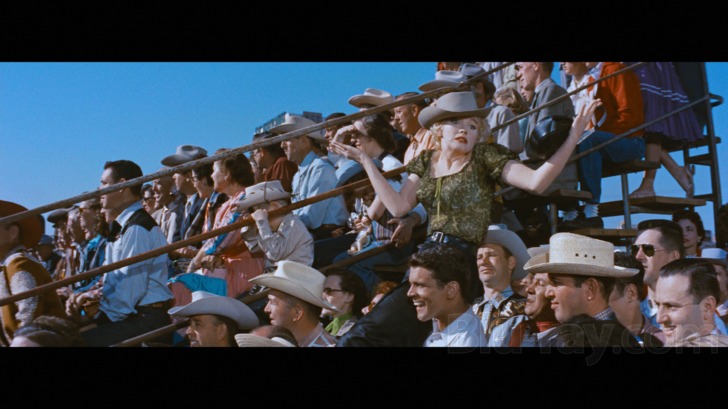
20th Century Fox has given Bus Stop a lossless DTS-HD Master Audio 4.0 mix that's true to the film's original quadrophonic stereo sound design, which used the Westrex 4-track recording system widely in use at the time. If you have a multi-channel home theater set-up, most of the audio will emerge from the front speakers, but you'll also hear appreciable engagement from the rear speakers at key points in the film, usually in the form of light ambience and swelling music. Frequent 20th Century Fox composers Alfred Newman, Lionel Newman, and Cyril J. Mockridge provide the orchestral score—which sounds great here, clear and full and never brittle—and the film also has a main theme from arranger Ken Darby in "The Bus Stop Song," performed by the Canadian singing quartet The Four Lads. As with the video transfer, there are no substantial age-related problems here—no popping, overt hisses, splice crackles, or peaking—and dialogue remains clean and stable throughout. The disc includes a number of dub and subtitle options; see above for the complete details.
Bus Stop Blu-ray Movie, Special Features and Extras 
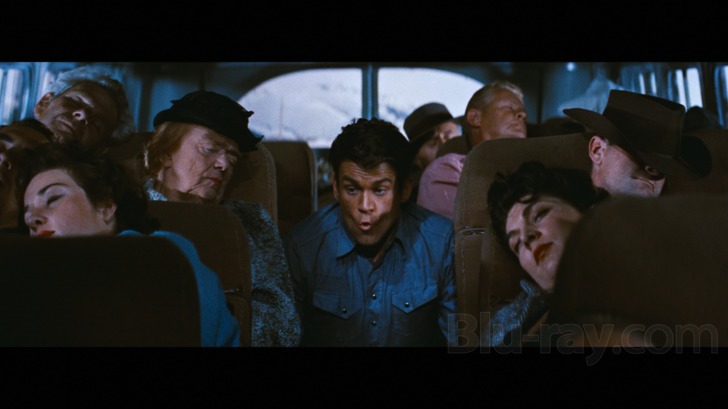
The only extras on the disc, unfortunately, are the film's theatrical trailer (HD, 2:25) and a collection of trailers for additional Monroe movies from 20th Century Fox. Surely there's some old Turner Classic Movies Marilyn Monroe retrospective 20th Century Fox could've dug up, licensed, and included here.
Bus Stop Blu-ray Movie, Overall Score and Recommendation 
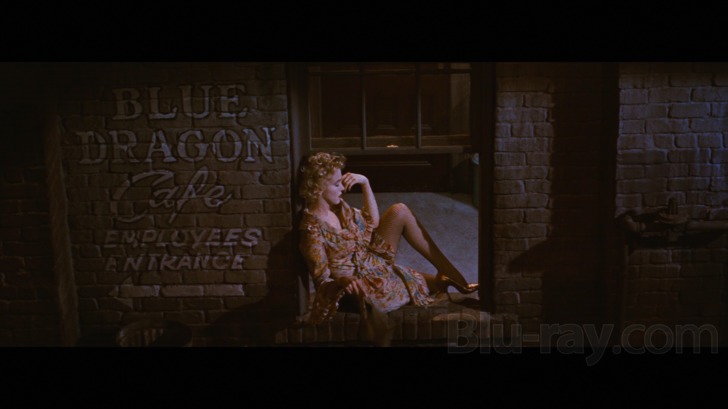
Bus Stop is often cited as the film that made critics sit up and take Marilyn Monroe seriously as an actor, and not just another pretty face and stunning figure. While Monroe is good here, the movie itself—an old-fashioned romance that leans heavily on 1950s morals and an everyone- deserves-a-second-chance message—is nothing special. The film's brand of folksy, home-spun comedy hasn't particularly aged well, and co-star Don Murray is progressively more and more grating as the yokel cowboy who practically hog-ties Marilyn into romantic submission. Minus the lack of special features, 20th Century Fox's Blu-ray release is stellar—all of the films from their Monroe series have looked wonderful—but Bus Stop is only a must-buy for the biggest fans of the iconic bombshell.
Similar titles
Similar titles you might also like

There's No Business Like Show Business
1954

Gentlemen Prefer Blondes
1953

How to Marry a Millionaire
1953

The Seven Year Itch
1955

The Misfits
1961

Happythankyoumoreplease
2010

Some Came Running
Warner Archive Collection
1958

Inventing the Abbotts
1997

Niagara
Fox Studio Classics
1953

Roman Holiday 4K
70th Anniversary
1953

Mona Lisa Smile
2003

Muriel's Wedding
1994

The Rose Tattoo
1955

Waitress
2007

Bridget Jones's Diary
2001

The Grass Is Greener
1960

Hobson's Choice
1954

Shirley Valentine
1989

Corrina, Corrina
1994

The Way We Were 4K
50th Anniversary
1973